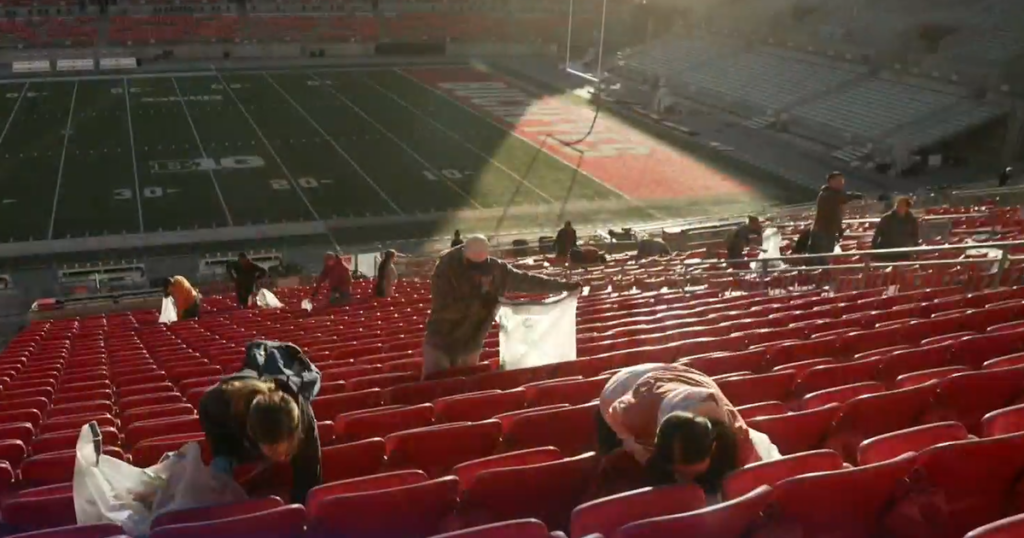The fierce rivalry between the University of Michigan and Ohio State University extends beyond the football field, reaching into the realm of sustainability and waste management during game days. As part of the Campus Race to Zero Waste program, both universities compete annually to divert the most waste from landfills. In the previous season, Ohio State not only secured a national title in football but also emerged victorious in waste diversion, showcasing effective recycling efforts. This ongoing challenge not only highlights environmental initiatives but also fosters student engagement in sustainability.
| Article Subheadings |
|---|
| 1) The Legacy of Rivalry |
| 2) The Role of Student Volunteers |
| 3) The Impact of the Campus Race to Zero Waste Program |
| 4) Innovative Sustainable Practices |
| 5) Looking Toward the Future |
The Legacy of Rivalry
The rivalry between Michigan and Ohio State is one of the most storied in sports, with deep roots in both athletic and cultural history. Each season, the stakes rise not only in terms of football performance but also in the realm of sustainability, where both schools seek to outdo one another in waste management efforts. This rivalry extends to examining how the campuses manage game day waste, an aspect that has gained significant traction in recent years. The challenge ignites a spirit of competition that encourages both sides to innovate and strive for greater efficiency in their waste disposal methods.
The Role of Student Volunteers
Students play an essential role in these sustainability initiatives, becoming the beating heart of waste management efforts during game days. At Ohio State University, student volunteers like Meredith Butt dedicate their weekends to educating fans on proper waste disposal. These volunteers sort through trash, ensuring that recyclables and compostables are correctly separated. The enthusiasm and commitment demonstrated by these students foster a culture of sustainability, emphasizing that individual actions can contribute to collective environmental goals. The impact of their work is visible, as they help transform the perception of waste management from a mundane task to a vital community effort.
The Impact of the Campus Race to Zero Waste Program
The Campus Race to Zero Waste year-round competition encourages institutions across the country to focus on sustainability during athletic events. The program allows campuses to showcase their dedication to minimizing waste through recycling and composting efforts. The framework of competition provides schools with benchmarks for waste diversion that inspire them to push their limits. Ohio State’s remarkable achievement of diverting 94% of game day waste last season highlights the effectiveness of these strategic initiatives, significantly surpassing Michigan’s 79%. This annual contest not only serves as a platform for measurable results but also raises awareness amongst fans, incorporating sustainability into the game day experience. Such initiatives are essential in shaping the future of waste management practices at these institutions.
Innovative Sustainable Practices
Both universities have embraced innovative practices that enhance their sustainability initiatives on game days. For instance, Michigan employs a unique composting strategy, diverting food waste generated during games back into valuable soil. This compost is then used on the university’s campus farm, illustrating a circular economy model where waste is repurposed beneficially. Similarly, Ohio State’s program focuses on educating fans about waste reduction and properly sorting materials using clear signage and guided assistance from engaged students. These strategies reflect a broader commitment to sustainability that extends beyond mere numbers; they cultivate a greater consciousness around waste management that resonates with the larger community.
Looking Toward the Future
As both institutions continue to improve their waste management strategies, the ongoing rivalry inspires them to adopt new techniques and encourage fan engagement. The sustainability battle has become an integral part of the university culture, influencing how both students and alumni approach issues of waste and environment beyond the football field. With each passing season, the challenge to divert waste from landfills elevates the importance of sustainability in collegiate athletics. This momentum can set an example for other institutions to follow suit in prioritizing environmentally responsible practices, ultimately contributing to a broader movement towards sustainability in sports.
| No. | Key Points |
|---|---|
| 1 | The rivalry between Michigan and Ohio State extends to sustainability initiatives focused on waste management during game days. |
| 2 | Students are actively engaged in sustainability efforts, educating fans and sorting waste during games. |
| 3 | The Campus Race to Zero Waste competition encourages schools to find creative solutions for waste diversion. |
| 4 | Innovative practices include composting food waste into soil used for growing vegetables at on-campus farms. |
| 5 | The sustainability initiatives set a positive precedent for other institutions regarding environmental responsibility in athletic events. |
Summary
The competition between Michigan and Ohio State transcends traditional sports rivalries, fueling a growing commitment to sustainability in waste management. As both institutions showcase their diverse initiatives and engage students in sustainability efforts, they highlight the importance of environmental awareness within collegiate athletics. The positive outcomes of the Campus Race to Zero Waste program illustrate the potential for effective waste diversion and recycling practices that can influence future generations.
Frequently Asked Questions
Question: What is the Campus Race to Zero Waste program?
The Campus Race to Zero Waste program is an initiative that encourages universities to compete in reducing waste generated during events, particularly by promoting recycling and composting efforts.
Question: How do student volunteers contribute to sustainability efforts?
Student volunteers play a vital role by educating fans on proper waste disposal, sorting recyclables and compostables, and fostering a culture of sustainability during events.
Question: What was Ohio State’s achievement last season regarding waste diversion?
Last season, Ohio State diverted 94% of their game day waste from landfills, outperforming Michigan’s diversion rate of 79% as part of the annual competition.


